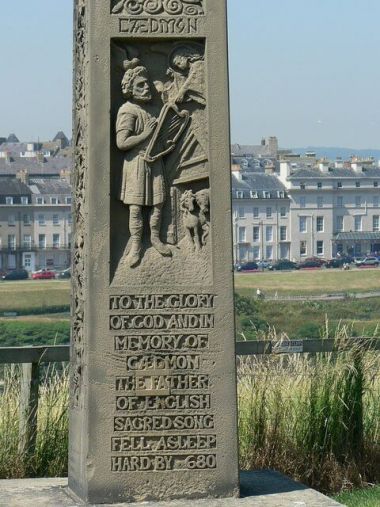The story of the man who taught the English to sing hymns

Name the best Christian song-writers working in English today and we'd all have our own opinions. Name the greatest over the last couple of centuries and it might not be so controversial – Isaac Watts would probably be there, Charles Wesley and perhaps Fanny Crosby too.
But what about the very first? His feast day is today, he was a monk in the Abbey of Whitby in the 7th century, and his name was Caedmon.
His story is told in Bede's History of the English Church and People, written a century later. Bede too was a monk in north-east England and it's through him we have Caedmon's own words in Old English, though translated by Bede into Latin.
Bede says that whenever any passage of Scripture was explained to Caedmon, he could "quickly turn it into delightful and moving poetry in his own English tongue". He would only create sacred poetry, because his gift was from God.
According to Bede, Caedmon was a lay brother in the monastery and "well advanced in years" when he received the gift. It was the custom at a feast for a harp to be passed round and for the guests to be invited to contribute to the entertainment; Caedmon would always get up and go out when he saw it approaching him. On one such occasion he went out to the stable and lay down to sleep. He saw in a dream a man standing by him who said, "Caedmon, sing me a song." "I don't know how to sing," he replied. "It is because I cannot sing that I left the feast and came here."
"But you shall sing to me," the man said. He told Caedmon to sing about the Creation, and immediately he found he was able to do so.
In the morning he told the reeve, his superior, what had happened. The abbess, the famous Hild, told him to repeat the verse. They gave him other scriptures to turn into song, which he did. He became a full monk and was instructed in all the sacred scriptures. Bede puts it delightfully: "Caedmon stored up in his memory all that he learned, and like one of the clean animals chewing the cud, turned it into such melodious verse that his delightful renderings turned his instructors into auditors."
At the end of his life he had a premonition of death, took communion and died in perfect peace: as Bede says, "Having served God with a simple and pure mind, and with tranquil devotion, he left the world and departed to his presence by a tranquil death."
Caedmon's hymn is the oldest English poem. It was created not long after the Northumbrians had been converted to Christianity, so in spite of its traditional form it would have seemed new and exciting. In Old English it is rhythmic and based on alliteration rather than rhyme. Here it is in a modern translation:
Praise we the Fashioner now of Heaven's fabric,
The majesty of his might and his mind's wisdom,
Work of the world-warden, worker of all wonders,
How he the Lord of Glory everlasting,
Wrought first for the race of men Heaven as a rooftree,
Then made the Middle Earth to be their mansion.
Fans of JRR Tolkien and The Lord of the Rings will recognise the reference to Middle Earth; his day job was as a great Anglo-Saxon scholar.
We should remember Caedmon, and be glad of his gift; and perhaps take time to chew the spiritual cud, and get all the nourishment we can out of the Word of God.
Follow Mark Woods on Twitter: @RevMarkWoods











